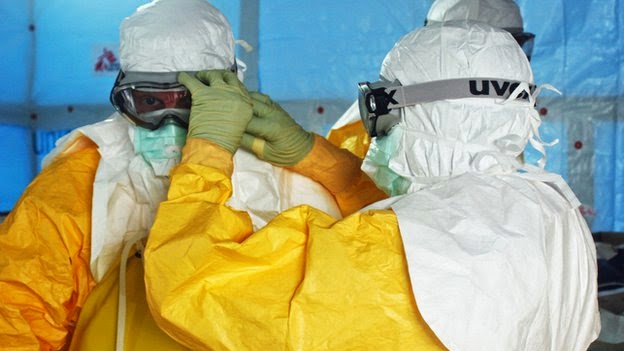Ebola: When health workers' duty to treat is trumped
Ebola: When health workers' duty to treat is trumped
The president of the World Bank has urged thousands of health workers to volunteer in the battle against Ebola, invoking their duty under their oath to help patients. But is there such an obligation? Medical ethicist Dr Daniel Sokol says we should expect some healthcare staff to refuse to go to work, wherever Ebola patients are being treated.
In all major Ebola outbreaks, medical staff have fled health centres, leaving dying patients behind. This one is no exception.
Seeing colleagues succumb to the disease, many doctors, nurses and laboratory technicians have failed to turn up to work, putting even greater pressure on those who remain.
If several cases of Ebola emerged in the UK, it would be naive to assume that no healthcare worker would refuse to work.
In 2003, I worked as an intern in clinical ethics at a hospital in Toronto. That was the city most affected by Severe Acute Respiratory Syndrome (Sars) outside Asia, with about 250 people infected.
Of those, about half were health workers. Posters lined the walls of the hospital, hailing the staff as heroes.
In reality, many of them were stigmatised by the community. Some healthcare staff in Toronto did not turn up to work out of concern for their own welfare and that of their family, and some complained that their colleagues in the nearby hospital received "danger pay" for treating Sars patients when they did not.
Ostracism threat
This was one of the foremost hospitals in the world, with superb facilities and highly trained staff. The case fatality rate was about 16%.
In the current Ebola outbreaks, health workers are also affected but, in contrast to the Toronto situation, the medical infrastructure in the affected African countries is poor and hospitals understaffed. The case fatality rate is about 55%.
Staff face a threat of ostracism or violence from a hostile local population. Many workers are paid very little or, in some cases, have received no pay for months.
During the Ebola outbreak in Uganda in 2000, there was mass protest at St Mary's Hospital, in Lacor.
After the deaths of several hospital workers, about 400 staff assembled in front of the hospital, threatening to leave.
Dr Matthew Lukwiya, the hospital's medical superintendent, persuaded them to stay. Soon after, Dr Lukwiya contracted the disease after caring for an infected nurse without protective goggles, and died.
Given the high risk, poor working conditions, and stigma attached to caring for Ebola patients, it is not surprising that many healthcare workers have fled the "hot zones" and others are reluctant to join the fray.
Duty of care?
The Hippocratic Oath, which dates from the 5th century BC, is silent on the issue of doctors helping people in times of plague and epidemics. Further, only a minority of doctors now recite the oath upon qualifying.
The UK's General Medical Council instructs doctors that: "You must not deny treatment to patients because their medical condition may put you at risk."
Given the UK's resources, Ebola is unlikely to create a high level of risk to health workers. In the affected parts of Africa, where even rubber gloves may be in scarce supply, the situation is very different.
In return for the onerous duty imposed by the GMC, doctors in Britain expect hospital authorities to provide suitable training, equipment and pay.
Yet for many of the doctors battling the Ebola outbreak, none of these reciprocal duties has been fulfilled.
Clinicians have a duty of care towards their patients, but this duty has limits.
There are a number of factors that determine these limits. One is the level of risk to the clinician.
Duty to others
Working in ill-equipped and understaffed hospitals, the risk to clinicians may be far higher than in a modern hospital.
Another is the likely benefit of turning up to work for the patients. There is no cure for Ebola, and some health centres do not have the drugs and equipment so readily available in the Western world.
Another factor is the duties to other patients, including future patients. Ebola has not stopped people suffering from other diseases and injuries.
A doctor who dies or falls ill with Ebola cannot care for patients. There are only about 50 doctors in Liberia for a population of over 4 million. The loss of even a single doctor is a public health disaster.
Finally, clinicians may have other moral duties to their family and community. A doctor is not just a doctor but may also be a father, son, brother, carer, community leader and so on. Each of those roles will bring moral duties. Should a doctor's duty to an Ebola patient trump his duty to his own children?
There are some acts that go beyond what duty requires. Many clinicians caring for Ebola patients in dreadful conditions, despite high risks to themselves, are acting beyond the call of duty. They deserve praise.
As for the others, who have decided to stay away, we should be slow to criticise them without an appreciation of their individual circumstances.


Comments